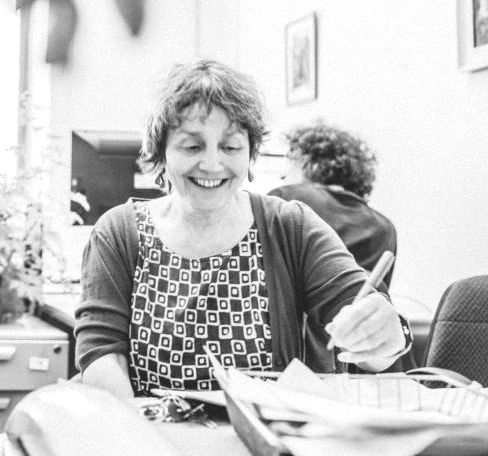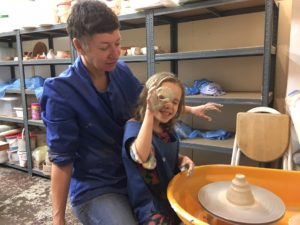Fiona Frank, Green Elephant Cooperative

Fiona is a director of Green Elephant Cooperative, which manages Halton Mill – a co-working space for start-ups, social enterprises, community-based organisations, artists and freelancers. Fiona is on the Community Business Trade Up Programme 2017-18.
Why did you start this organisation?
About a decade ago, five friends got together to try to pursue a different way of living: an alliance brought together to find a better sort of housing. One that was kinder on the planet, more sustainable, and more community-involved.
We started looking in central Lancaster, but to get the planning permission to build our houses, we had to commit to renovating a disused engineering factory into an employment centre for the next 10 years. None of us had gone out looking to develop a co-working space, but that’s what ended up happening. Our initial plan forecast 50% occupancy of the co-working space for the first five years. We were at 75% within the first year. We didn’t really have to market it – it just came through word of mouth. And we tried to fill it with the most interesting people.
Now the space welcomes festivals, music and arts events, workshops, yoga classes and all sorts! During that period, Lancashire’s adult learning college also shut down. They moved three courses a week to Halton Mill, so we’ve moved into adult learning too.
Why is your organisation needed?
There’s already a community centre in Halton but it offers different things. We work closely and make sure we support one another. They run family events and keep-fit classes, and we run more quirky and arty things. We can be more experimental in our approach. For example, theatre companies might test out new productions here.
It’s not just a shared work-space or events venue. People come here to work then find friends. Many people have told us how it’s relived them from loneliness and isolation, and built relationships among people from different fields.
Has the programme helped with your plans for growth so far?
We’ve set up a new project entirely because of an exercise we did in our second training session. Our learning manager gave us each a piece of paper with our local area printed on it, and then asked questions like: what are the significant places and people in your area; what’s missing; what’s happening in this geography. Two things happened for me…
First, I looked at the piece of paper, and said: “we should add Lancashire and Morecambe on here!” And instead of telling me that was ridiculous or I should just focus on my immediate area, my learning manager came over with a bigger piece of paper and some sellotape, and said: “Add it on!”
Second, I then realised there is so much going on in our village – we never got as far as writing on the ‘Lancaster’ and ‘Morecambe’ pages! It’s popular among anglers, cyclists, walkers, and those seeking areas of great natural beauty – and good pubs! There are also lots of retired professionals, who probably need some adult learning. The thinking evolved into the new project, Learning at the Mill. We threw out a range of subjects and invited people to pitch to teach these and other subjects. Now we’ve lined up courses in 12 traditional-ish adult learning subjects, including Holiday Portuguese, art, bicycle maintenance, creative embroidery, stop frame animation, Colombian Street Food, and ‘Carbon Conversations’ (learning to cut down your carbon footprint).
The Match Trading grant from the programme gave us the confidence to push forward with the idea, because we’ve structured it so we can’t lose money as long as someone comes to those courses. And if they do, we double our revenue.
What else has the Match Trading grant helped?
For example, I saw a great theatre company at the Edinburgh Festival who perform Shakespeare on bicycles! I really wanted them to perform here, but ordinarily we wouldn’t have been able to afford their upfront costs, in case only 30 people came. But I had the confidence to go back and say: let’s go for it, we’ll get the door money, and the takings from the café, and we’ll get the income from the grant if we need it.
 I had the confidence to do that because I knew then we wouldn’t lose anything if we didn’t make a penny, but we could double our income from the Match Trading grant if we went for it. My directors are now allowing me to go ahead with that sort of thing.
I had the confidence to do that because I knew then we wouldn’t lose anything if we didn’t make a penny, but we could double our income from the Match Trading grant if we went for it. My directors are now allowing me to go ahead with that sort of thing.
We’ve got another two or three big things in autumn like that, and I think we’ll increase our sales by £10,000 by Christmas!
The Match Trading grant also means we can hopefully start paying ourselves more fairly for the work we do. At the moment, directors are only being paid for about half the work we do. I already work another job and have a couple of things going on, so I do need to be paid. Now we feel like we can actually pay ourselves, which is very nice!
I’m absolutely over the moon with that, and the Match Trading grant is freeing things up for us and really making us excited about the things we’re doing.
